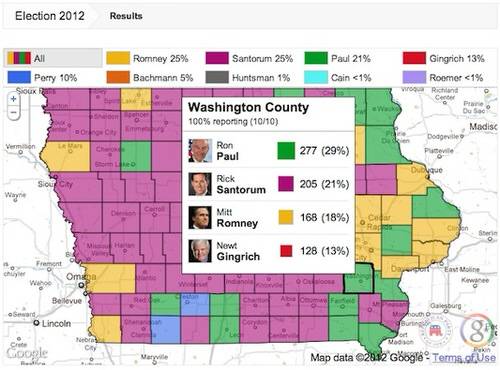My main man Steve Myers over at Poynter has broken down the outcome of a brand new phenomenon in the coverage of elections. Google’s U.S. elections portal, launched just ahead of the Iowa Caucuses on January 3, provided more useful data about the caucus results than the Associated Press did. According to the veterans with whom Myers spoke, it was quite an upset. The speed and portability, not to mention the $0.00 price tag, of Google’s data made an impression on the news outlets covering the caucus.

Myers points to WNYC’s coverage as a superb example of the advantages gained by incorporating Google tools into original coverage. There’s no question that Google has built a useful platform for news organizations on top of its existing core services. Myers wonders whether Google could even compete directly with the AP for the lucrative business of reporting election returns, and his sources believe it could, if its leaders wanted to. But I think there’s even more going on with these Google election initiatives. It looks to me like Google is searching for ways to disrupt the whole election news business.
Cheaper, Faster & Just As Good
While major news outlets, including the NY Times, MSNBC and Huffington Post were relying on AP results, Google’s data came in faster and went straight to a dynamic map. Google proved it has a formidable technical advantage over news-focused organizations when it comes to this kind of coverage. Even if a news outlet does build its own in-house mapping platform, it’s a tall order to build one as scalable, reliable, responsive and extensible as Google’s is.

Google’s tools are therefore pretty hard to resist. WNYC combined them with in-house work and software, and it did a bang-up job. The organizations that used AP data sound a little jealous in talking to Myers. “Google was ahead, definitely ahead,” Aron Pilhofer of the NY Times news applications team – which uses AP – told Myers. The Guardian’s U.S. newsroom, still getting its sea legs and watching U.S.-based organizations closely, thought that WYNC’s John Keefe’s fine tuning of the Google map was even more accurate.
The Tools Are Free, But The Methods Are Secret
To me, the most intriguing part of Myers’ inquiry is that Google was cagey with him about its exact methods. The Google Elections portals are built on top of ordinary, free Google services, which anyone can use. If you wanted to set up your own Google Map tracking election results in real time, pulling in data to Google Docs and visualizing using Fusion Tables, you theoretically could. Even so, Google wouldn’t tell Myers exactly how they did it in order to beat the AP’s coverage.
The Iowa GOP worked with Google to create the system for tabulating the results. Staff and volunteers collected the data from the 1,774 precincts using Google Apps, and the verified data went out to services tracking in real time, including Google and the AP. Google wouldn’t tell Myers exactly what they did with the data, and the AP relayed a statement to him that sounds like a bit of an excuse. Basically, they used the same Google Apps-powered tables, but they double- and triple-checked everything.
“Scrupulous verification” is great, but it’s also slow. The fact is, Google’s team wasn’t hasty; it was just faster. It had a competitive edge. As Myers reports, the AP is heavily invested in being the best at this, and Google was just doing it in Iowa as an experiment. It’s not even providing the same service in New Hampshire or South Carolina. And yet Google wants to maintain its competitive advantage over the AP by not revealing the specifics of its methods.

Google’s Secret Sauce
Myers raises great points about trust. The AP is a nonprofit journalism outfit, and Google is a for-profit ad company built on good data science. The AP is dedicated and scrupulous, but Google’s tools are extensible and free. “Once all those votes are counted,” Myers asks, “to whom does that information belong?” That’s a crucial question. But as a clue, consider how transparent Google is with the public data it collects. Google’s secret sauce is not in the data itself. It’s in the methods of analysis.
When Google launches free consumer election portals in Egypt or the U.S., it’s doing more than just providing live maps of the returns. It’s aggregating news stories, and it’s providing background research and search tools on candidates and issues. But it’s also doing what Google is always doing: gathering data on users and their preferences.
The Google.com/elections pages might not be major traffic destinations, but Google’s giving away its embeddable tools to news organizations, so it will gather data from their sites. Google is going to learn what online consumers really want out of political news, and since it’s guarding its methods, it will be in a privileged position to give it to them.
Where do you turn for election news?










